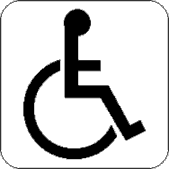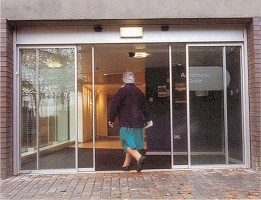Disability Discrimination Act
| The Disability Discrimination Act (DDA) gives disabled people in the UK important rights of access to "everyday services". |
 |
Everyday services
"Everyday services" include services provided by local councils, doctors' surgeries, hotels, banks, pubs, theatres, hairdressers, places of worship, courts and voluntary groups such as play groups. Non-educational services provided by schools are also included.
Access to services is not just about installing ramps and widening doorways for wheelchair users - it is about making services easier to use for all disabled people, including people who are blind, deaf or have a learning disability.
Reasonable adjustments
 |
Failure to make reasonable adjustments without justification is discrimination.
Under the DDA, it is unlawful for service providers to treat disabled people less favourably than other people for a reason related to their disability. Service providers now have to make ‘reasonable adjustments’ to the way they deliver their services so that disabled people can use them.
|
Examples of reasonable adjustments include:
- installing an automatic door entry/eit system for people with motor difficulties or in wheelchairs
- installing an induction loop for people who are hearing impaired
- giving the option to book tickets by email as well as by phone
- providing disability awareness training for staff who have contact with the public
- providing larger, well-defined signage for people with impaired vision
- putting in a ramp at the entrance to a building instead of, or as well as, steps
What is considered a ‘reasonable adjustment’ for a large organisation like a bank may be different to a reasonable adjustment for a small local shop. It’s about what is practical in the service provider’s individual situation and what resources the business may have. They will not be required to make changes which are impractical or beyond their means.
Failure or refusal to provide a service that is offered to other people to a disabled person is discrimination unless it can be justified.
Why should businesses make improvements for disabled customers?
There are about 10 million disabled people living in the UK - all of whom are potential customers who can choose where to spend their money. It is estimated that disabled people spend around £50 billion a year on goods and services. If you are positive and welcoming in your approach and provide a good service, you will attract not only disabled customers but also their friends, relatives, carers and colleagues. Word will soon get around that you are positive about disability.
|
Improving access to services for disabled people improves access to services for everyone and is about basic good customer service. Ensuring the front entrance to a shop, restaurant or leisure centre doesn't have steps or a heavy door will make it easier for many disabled people but also for parents pushing buggies, people carrying shopping and many older customers. Improvements like better lighting benefit everyone, as does good signage that directs you to the goods you want. By welcoming disabled customers you welcome all customers.
|
 |
There are therefore good business reasons for catering for disabled people. Many changes required for this can be made without any, or with very little, effort or expense, and it may simply involve making some adjustment to your business environment or working practices. They will help you to foster good relations with your customers by demonstrating that you offer services on an equal footing to all customers, regardless of any disabilities they may have, and they may also be of benefit to your own employees.
For those service providers who don't necessarily charge their customers, like local authorities, voluntary organisations and health services, it’s still important to deliver good customer service, increase the number of customers and their satisfaction levels and increase your reputation.
You probably treat your disabled customers as well as you treat everybody else. But there are some service providers who don’t. The Disability Discrimination Act (DDA) aims to put this right. Adopting good practice and complying with the duties and requirements of the DDA avoids the risk of costly litigation and bad publicity. Failing to do so could mean that you are brought before a court of law.

The Disability Rights Commission promotes the concept of a society where all disabled people can participate fully as equal citizens. It also provides advice to disabled people and service providers.
Click on the above logo or hyperlink to visit the DRC website.

Disability Discrimination Act 1995
You can also read the full text of the Disability Discrimination Act 1995 at the Office of Public Sector Information website.
|